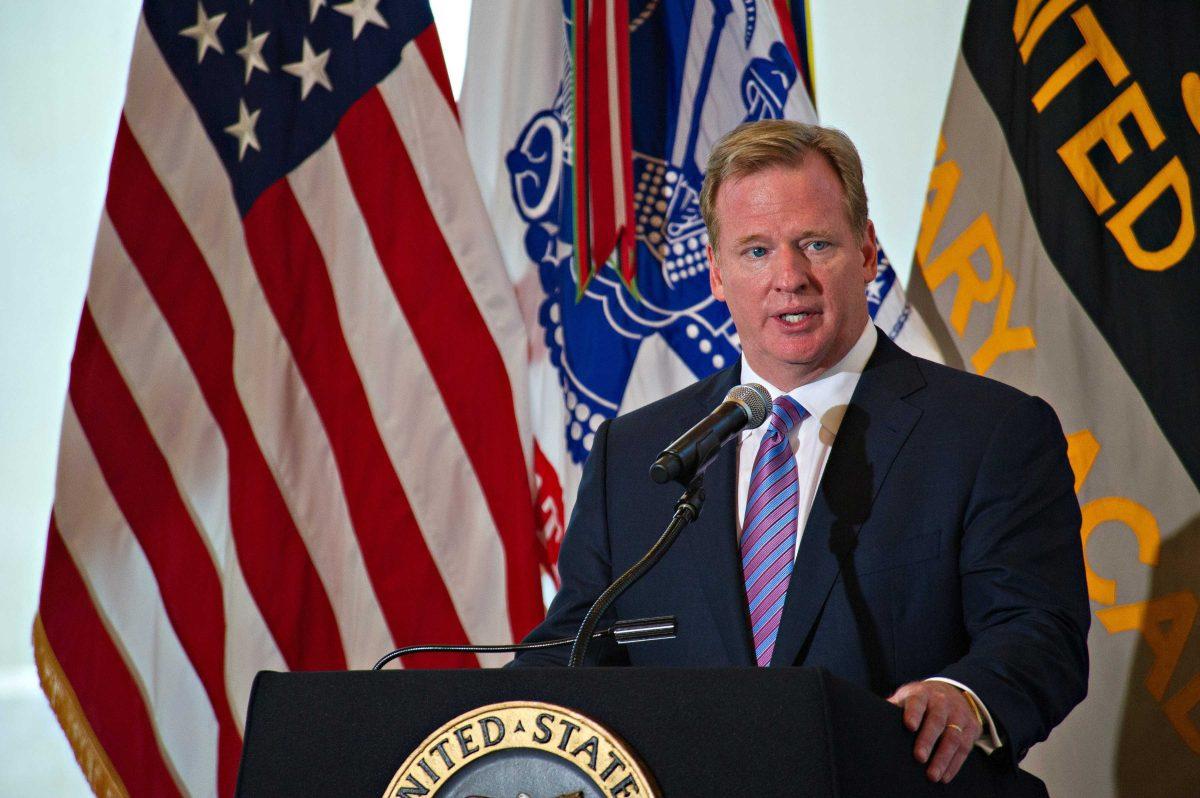On Nov. 7, a report surfaced about a one-on-one interview with NFL commissioner Roger Goodell and former NFL quarterback and activist Colin Kaepernick. This potential meeting is coming after President Donald Trump’s comments about kneelers, Bob McNair’s inmate remarks and Jerry Jones’ public performance of kneeling one week, followed by his anti-kneeling comments two weeks later.
Goodell’s first half of the season has been eventful, and he must get a hold on the owners before he expect any change with Kaepernick or the league as a whole. Goodell has a responsibility to his players.
In 2013, USA Today polled 300 NFL players, and a whopping 61 percent of the players did not support Goodell. Fans and players think Goodell is a commissioner who does not have the teams and players’ best interest in mind. Goodell’s seeming inability to gain support from fans throws a wrench in his ability to make change.
Goodell is no stranger to controversy since his start as commissioner in 2006. There have been team controversies like Spygate in 2007, Bountygate in 2012 and Deflategate in 2015. Goodell’s track record on punishments is not good either, from the Ray Rice debacle to Ezekiel Elliott’s on-again, off-again suspension for alleged domestic violence. Goodell’s track record is full of missteps, and that does not even include the conversation about concussions. With all that has happened, Dallas Cowboys owner Jerry Jones has gone so far to threaten to sue the NFL and fellow team owners over negotiations to extend Goodell’s contract.
The 2017 football season is an animal the NFL has never seen. Goodell and the NFL are getting it from all sides: many fans are angry at the players for protesting the anthem while others are angry at owners for stifling the players’ ability to express their feelings. Some players are angry at highly politicized white supremacy and the Trump administration as a whole. Even the owners are mad, mainly at the players for expressing themselves. This is where Goodell comes in and where the rubber meets the road for both Goodell’s future and his lasting legacy.
Goodell must decide what he truly believes. In a statement made on Oct. 10, he praised the NFL, saying he was “proud” of both owners and players for trying to make to change. Goodell then proceeded to take the owner’s line by saying the NFL expects players to kneel. Goodell must decide if he is proud or if he is going to restate the owner’s statements. Starting with Cowboys owner Jerry Jones’ comments on Oct. 8, 2017 telling his players that if they disrespect the flag that they won’t play. Houston Texans owner, Bob McNair, saw Jones’ comments and raised saying, “we can’t have the inmates running the prison,” an insensitive and disgusting comment from an owner of a team in a city that is 23.5 percent black.
If Goodell is to change people’s perception of him, he must understand that Jones and McNair’s comments cannot be allowed in a league that is 68 percent black. How can a commissioner who claims to be proud of his players and his owners not respond to McNair’s comments but will publicly say that the NFL expects players to stand? Goodell is setting a precedent that will only get the NFL into more trouble and greater controversy.
If Goodell is to save face for himself and the NFL, he must show strength against McNair and Jones, even if it may cost him his job. If Goodell is to show he has cared about his players, he must come as strong on McNair as the NBA did on then-Clippers owner Donald Sterling in 2014. Like it or not, McNair’s and Sterling’s comments are not that different even if the word choices are.
Roger Goodell has a responsibility to his players and has an opportunity to change the trajectory of his legacy and the league as a whole. However, his track record seems to be against him.
Miles Jordan is a 20-year-old liberal arts sophomore from New Orleans, Louisiana.








